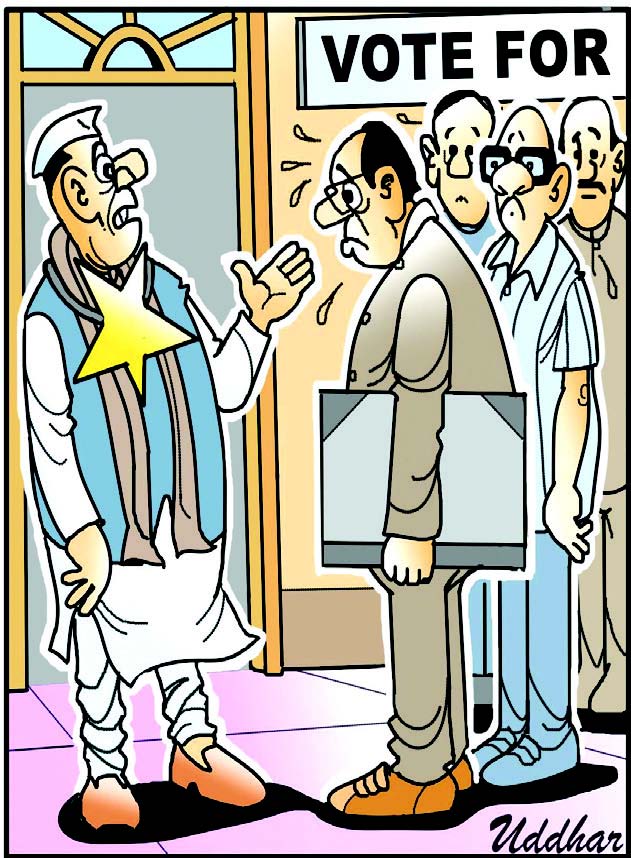
On a macro level, it’s bad news for Indians especially for job-seekers even as New Delhi advised Indians not to travel to Israel and Iran till further notice, “in view of the prevailing situation in the region”.
“All those who are currently residing in Iran or Israel are requested to get in touch with Indian Embassies there and register themselves,” the MEA advisory said. It added: “They are also requested to observe utmost precautions about their safety and restrict their movements to the minimum.”
However, on the macro level, New Delhi faces a diplomatic dilemma as it is in a Catch 22 situation following the crisis.
The MEA advisory came at a time when job-hit Indian workers were hoping to earn for themselves and their families albeit the risk in trouble-torn Israel.
It may be recalled that Israel had suspended the work permits of thousands of Palestinians and Arab migrants after the attacks on October 7 attacks. Notably, the Arabs and Palestinians earlier constituted the majority of the workforce of the country.
Following this, a massive labour crunch was triggered and Indian labourers were hoping to fill in the job slots and earn a fortune.
WHAT HAPPENED EARLIER
On April 1, suspected Israeli jets had bombed Iran embassy in Damascus, Syria in which Iran said around 7 military advisers, including three senior commanders died. Iranian sources also said that Mohammad Reza Zahedi, a senior commander in its Quds Force was killed. Zahedi played a crucial role and was directly responsible for managing Iran’s relationships with Lebanese Hezbollah, the Syrian government and Shia militias in the country and Hamas and the Palestinian Islamic Jihad in Gaza and the West Bank.
Though Israel did not claim responsibility for the attack, Iranian Supreme Leader Ayatollah Ali Khamenei had said on Wednesday that Israel “must be punished and it shall be”. In response, Israeli Prime Minister Benjamin Netanyahu said, “Whoever harms us, we will harm them. We are prepared to meet all of the security needs of the State of Israel, both defensively and offensively.”
The Russian and French too issued travel advisories on Friday. French authorities asked its citizens “to completely refrain” from travelling to Israel, Iran, Lebanon and the Palestinian territories, and the Russians warned its citizens not to travel to “the West Asia especially Palestine, Lebanon and Israel”.
Countries on the edge of their seats have called on Iran to exercise restraint to avoid a wider conflict. “Right now, it’s very important for everyone to maintain restraint so as not to lead to a complete destabilisation of the situation in the region, which doesn’t exactly shine with stability and predictability,” Kremlin spokesperson Dmitry Peskov said.
Foreign ministers of British and Germany called on their Iranian counterpart, Hossein Amirabdollahian, to urge maximum restraint, and avoid further escalation.
WHAT IS NEW DELHI DOING?
It was a hectic weekend for New Delhi as the growing unrest forced India to have sleepless nights. Where does New Delhi stand and what does this conflict mean for India?
Soon after Saturday’s attack on Israel, India issued a statement expressing “serious concern” and called for “immediate de-escalation”.
“We are seriously concerned at the escalation of hostilities between Israel and Iran which threatens the peace and security in the region. We call for immediate de-escalation, exercise of restraint, stepping back from violence and return to the path of diplomacy,” the Ministry of External Affairs said in a statement on Sunday.
As tensions between Israel and Iran escalated, Iran on Saturday captured a container ship near the Strait of Hormuz called MSC Aries. The Israeli-affiliated vessel had 17 Indian crew members and was en route to the port of Nhava Sheva in Mumbai.
MSC Aries is now in control of Iran’s Islamic Revolutionary Guards and safety of the Indian crew is a big major concern for India.
Now External Affairs Minister S Jaishankar has held talks with his Iranian counterpart Amir Abdollahian. Tehran has issued that Indian representatives will soon be allowed to meet the Indian crew members of MSC Aries.
“Spoke to Iranian FM @Amirabdolahian this evening. Took up the release of 17 Indian crew members of MSC Aries. Discussed the current situation in the region. Stressed the importance of avoiding escalation, exercising restraint and returning to diplomacy. Agreed to remain in touch,” Jaishankar wrote in an X post on Sunday.
The minister also spoke with the Israeli foreign minister Israel Katz, sharing concerns about the recent developments and discussing the “larger regional situation”.
India has a large diaspora in Israel of around 97,467, according to the MEA. More than 18,000 Indians work in the country, many as caregivers and agricultural workers. More Indians are expected to travel as the two countries signed a pact for 1500 citizens to be flown to the Jewish nation to be employed as workers in the construction sector. India sent the first batch on April 2, but following the escalation of trouble, New Delhi has now decided not to send the second group until the situation is declared brought under control.
India is in an unenviable position and is unfortunately not in a position to take sides and needs to walk the tightrope of diplomacy. New Delhi has strategic ties with both Iran and Israel.
Iran is an old partner and we have had relations with the country for a very long time. Tehran has been one of India’s major suppliers of crude even though this has been hit by Western sanctions.
The Chabahar Port acts as a gateway to Afghanistan and Central Asia and is important since Islamabad does not allow land transit to Indian goods.
India also has strategic ties with Israel, especially in defence and security sectors. New Delhi is a top buyer of military equipment from the country and Israel supported India during the Kargil War by providing ammunition. The India-Israel trade ties have become stronger and the trade is around $7.5 billion.
It may be noted how both India and Israel have common concerns about terrorism, and both the nations bear scars suffered during the 26/11 attacks.
It is needless to say how the relationship between New Delhi and Jerusalem blossomed in the last 10 years under the Narendra Modi regime. This has led to India backing Israel soon after the 7 October attacks even though the country does not consider Hamas as a terrorist organisation.
It is a difficult time for India and hence New Delhi is treading cautiously and has refrained from taking sides and has embarked on a more balanced approach.
A wider conflict in West Asia is not good news for India. The country imports 80 per cent of its crude oil from the region. In case of an escalation, oil supplies from West Asia are likely to be affected and this will lead to a rise in prices.
India also has a strategic partnership with major Arab countries, Iran and Israel. Its interests in West Asia are no longer restricted to oil imports and labour exports. Arab states are economic and political partners for India.
India is not only keen but is working overtime with all the stakeholders in the volatile region and is pushing hard for an India-Middle East-Europe economic corridor. This will ultimately have strategic and economic benefits for New Delhi. But a possible wider through plans for the future haywire.
It is important to keenly watch the fragile situation.
(The writer is a senior journalist and former Senior Associate Editor, O Heraldo)
